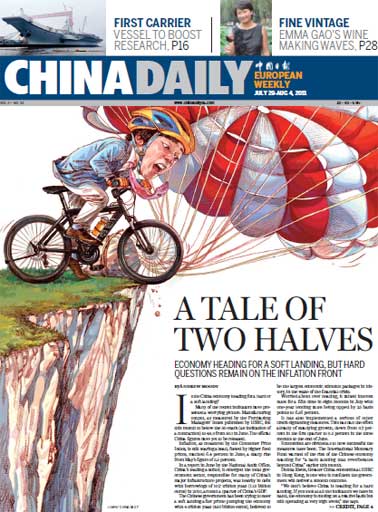Asia
Honeymoon over, Yingluck treads tightrope
Updated: 2011-08-03 17:11
(Agencies)
BANGKOK - Running a real estate business in the middle of a building boom is one thing. Running a country that's embroiled in a bloody political crisis may be a little more challenging, as Thailand's Yingluck Shinawatra is about to discover.
The honeymoon is over for the 44-year-old political novice, about to become Thailand's first female prime minister. Millions of poor supporters expect great things from her, while the country at large wants an end to a political crisis dating back to a coup that toppled her brother, Thaksin Shinawatra, in 2006.
It was thanks to Thaksin that Yingluck was catapulted from relative obscurity as president of SC Asset to stardom within days of her May 16 nomination to lead the campaign of the Puea Thai Party in the July 3 election.
But as she prepares to follow in Thaksin's footsteps after a parliamentary vote on Friday, it is her brother's perceived influence over the incoming government rather than her inexperience that could prove her downfall.
"The degree of her independence (from Thaksin) will determine the degree of acceptance of her," said David Streckfuss, an American academic at Khon Kaen University in northeastern Thailand.
"Because Puea Thai won so convincingly, Thaksin's opponents will have to rethink their plans, so a lot depends on what Thaksin does and whether Yingluck is seen to be in charge."
Thaksin bring out strong emotions on both sides. For his poor supporters, he was seen as the first Thai leader to address the needs of millions in the countryside, with cheap healthcare and village development funds.
For his opponents, he was not only corrupt and authoritarian but had republican leanings -- a charge he has repeatedly denied but one that has tainted him in a country that reveres its king.
Thaksin has made little effort to show he is not pulling the strings and has met ministerial hopefuls in Brunei and Dubai in recent weeks, forcing an embarrassed Yingluck to reject suggestions he will micro-manage her government.
If Thaksin is seen to be running the show from exile, Puea Thai could be in for a rocky ride.
Pro-Thaksin parties have dominated every Thai election in the past decade, but since 2005 each has been hamstrung by street protests, court decisions that have banned their leaders or dissolved them, or military intervention.
Puea Thai's parliamentary clout -- 265 of the 500 seats -- has eased fears of immediate turmoil: the size of the victory makes it highly risky for behind-the-scenes players to engineer judicial or military intervention without a public backlash.
That has been reflected in a jump in the baht since Puea Thai's win and a reversal in the fortunes of the stock market , which went from being Southeast Asia's worst performer in June to its best in July, gaining 8.7 percent with a net $1.2 billion in foreign inflows.
LEGITIMATE CHALLENGE?
Most analysts believe Thaksin's opponents will neither relent nor compromise, but will have to wait for the government to slip up to give a pretext for intervention.
"Yingluck's win was one of the strongest ever in Thai elections so to block her now is not possible," said Somjai Phagaphasvivat, a professor at Bangkok's Thammasat University.
"Any move against this government has to be calculated. They must wait for missteps and mistakes but there must be a legitimate cause, otherwise it would result in turmoil."
What such a cause might be is open to interpretation.
During his two terms in office, Thaksin derived legitimacy from his huge electoral mandates, but those who plotted his overthrow in 2006 justified their actions as a move to rescue the country from entrenched corruption and cronyism.
The weight of expectation will be on Yingluck, not just to deliver on a wave of big-spending, populist policies without damaging the economy but to govern transparently, without the corruption scandals, conflicts of interest and media censorship that critics say characterised Thaksin's governments.
Many politicians, businessmen, police officers and army generals who stuck by Thaksin after he was pushed out might now be expecting promotions, concessions or cabinet portfolios.
The pro-Thaksin "red shirt" movement that battled troops in Bangkok last year has a dozen of its leaders in parliament. Their supporters say some deserve cabinet posts and could withdraw their backing from Yingluck if she does not deliver.
But if she plays along, Bangkok's middle class will be outraged, seeing it as rewarding people who went on a rampage of rioting and arson after their protest was put down last May.
The release on bail on Tuesday of red shirt leader Jatuporn Prompan -- charged with lese-majeste, or offences against the monarchy, but also facing terrorism charges relating to the protests -- is a case in point.
His presence in parliament is provocation enough for some Bangkokians, the suggestion he could become a minister an anathema.
But the biggest test for Yingluck is how she handles the issue of Thaksin's return. He wants to come home without having to serve a two-year jail term for abuse of power, but any early move to give him an amnesty could be political suicide.
Somjai of Thammasat University reckoned Puea Thai would work to ensure political and economic stability and only then draw up plans for a general amnesty to be put to a referendum to ensure it was both legal and accepted by the majority of Thais.
"Thaksin's return is Puea Thai's main agenda, so it wants to tread carefully and first make sure the political climate is right before it pursues an amnesty," he said.
Others believe there will be no right time for his return.
Thaksin is such a divisive figure that any attempt to arrange his homecoming is likely to revive the "yellow shirt" movement that paralysed the last two governments he controlled.
"I think Thaksin's return would trigger serious unrest, no matter when it comes," said Joshua Kurlantzick, a Southeast Asia specialist at the US-based Council on Foreign Relations.
E-paper

Double vision
Prosperous Hangzhou banks on creative energies to bridge traditional and modern sectors
Minding matters
A touch of glass
No longer going by the book
Specials

Ancient plate broken
An ancient porcelain plate was accidentally destroyed during a research in the Palace Museum.

Selfless actions
A 20-year-old girl becomes an Internet star for giving her first kiss to a drowning old man.

Space race
Homebuyers are learning the hard facts of supply and demand: too many cars and too few parking spaces.
